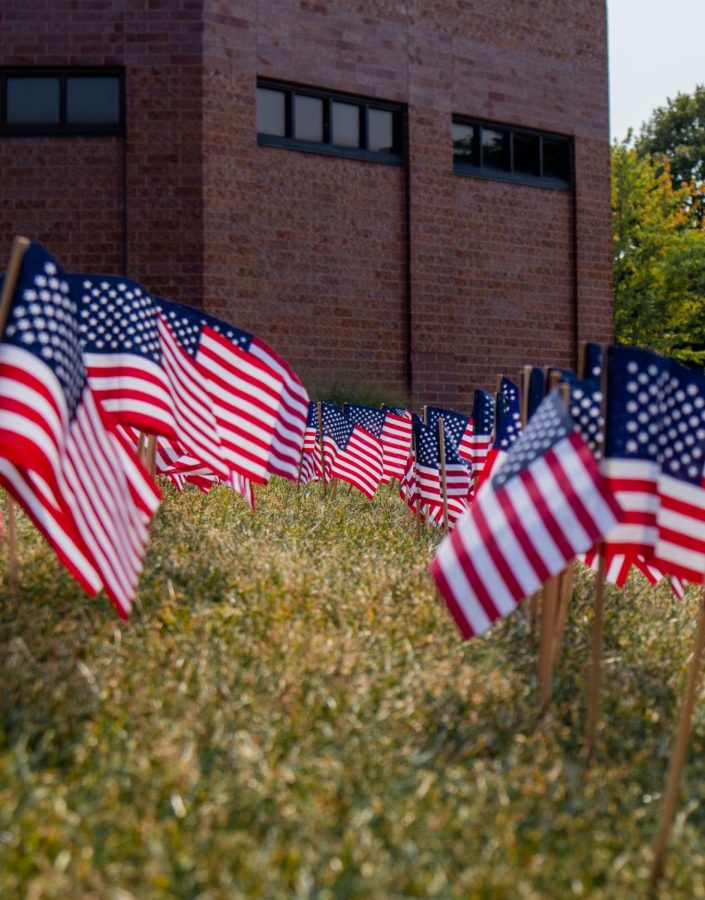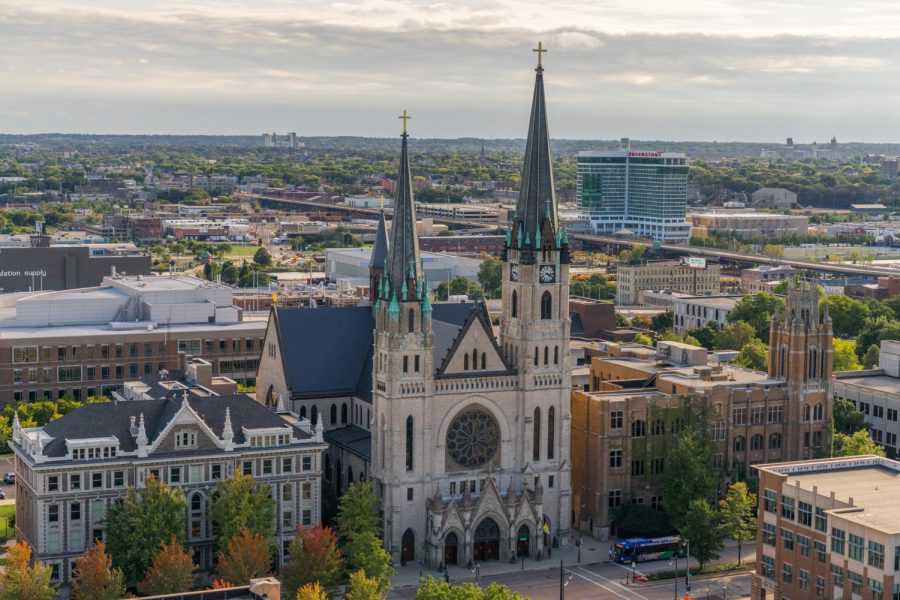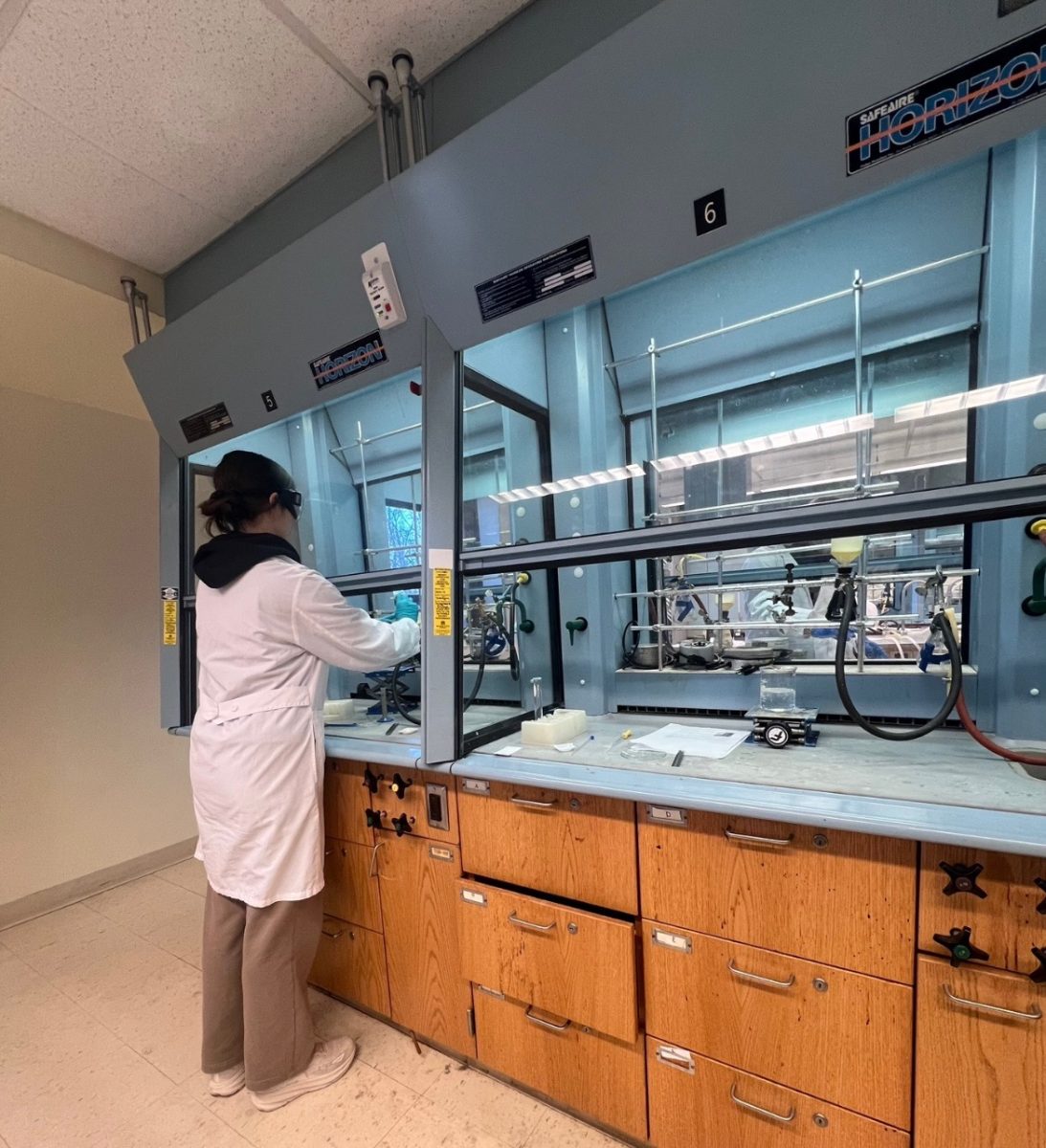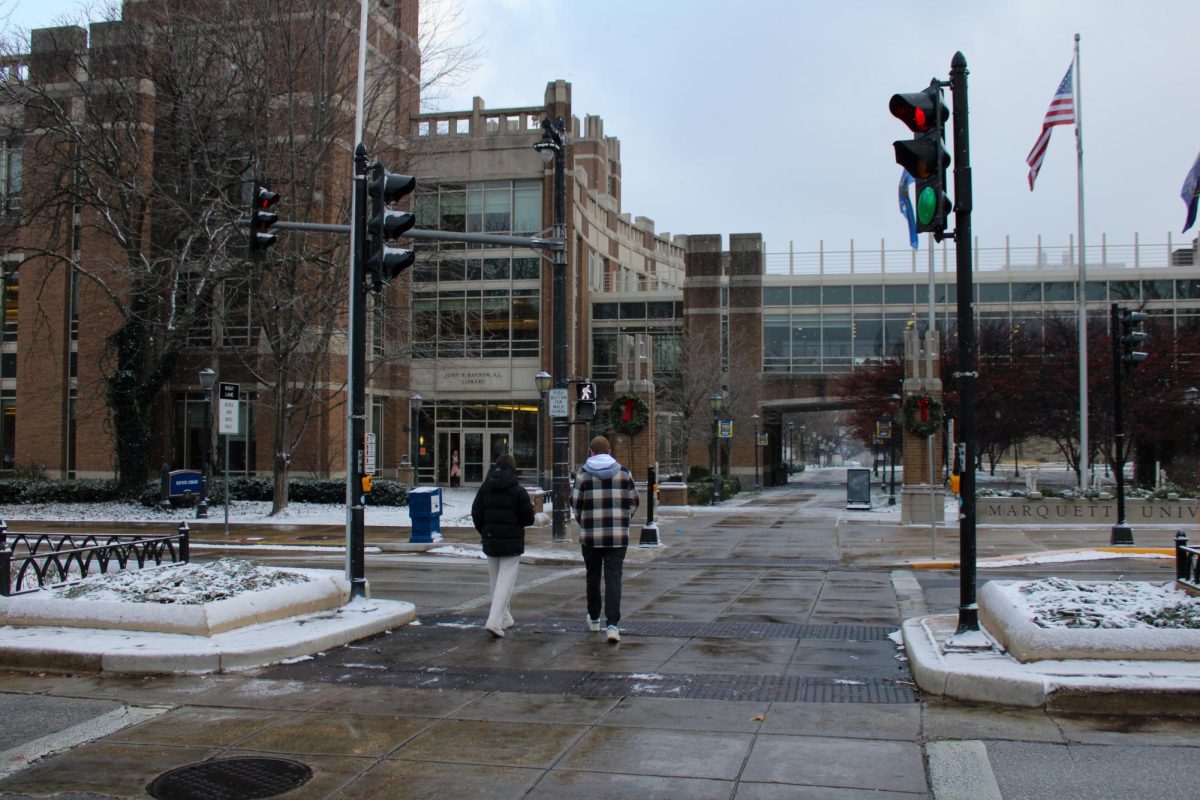
They teach our classes, celebrate our Masses and counsel us on a daily basis as hall ministers and priests. Even though they have been on campus for more than 100 years, there is much that students don’t know about Jesuits.
The Society of Jesus is an international religious order of priests and brothers founded by Saint Ignatius of Loyola in 1540. Jesuits are unique in that they emphasize living in the community and finding God in all things, according to the Society of Jesus in the United States.
Marquette, founded by Jesuits in 1881, is home to a total 55 Jesuit priests, who live in the Jesuit residence on campus. Fourteen more Jesuits live in the Arrupe House, said the Rev. Tom Lawler, vocations director of the Society of Jesus Wisconsin Province.
Although students see Jesuits on a daily basis, the priests are often confronted by students’ misconceptions about who they are and what their purpose is.
For many students, the Jesuits on campus are holy men in black suits and white collars. But in reality, they’re just ordinary guys with a special calling.
Stages
Men that want to become Jesuits go through a rigorous process, which consists of a series of five formal stages that are designed to prepare men for an Ignatian lifestyle and give them the proper tools for their specialty. These stages are outlined and described in “The Jesuits: One Mission, Many Ministries,” by the Society of Jesus in the United States.
On average, it takes 11 years for a man to become Jesuit.
Lawler said a man between the ages of 18 and 50 must first feel that he is being called by God to join the priesthood and have a strong desire to serve God.
Potential candidates enter a period of discernment that can last for up to a year or more. Lawler said it is a time when the society determines whether it is an authentic call. If Lawler or another vocation director determines the calling to be legitimate, the young man will be allowed to apply.
“Discernment is a Christian term for prayerfully listening to God’s call and making a decision about your life,” Lawler said.
After discernment, the formal process begins with Novitiate, a two-year stage when the potential Jesuits try out the Jesuit lifestyle. At the end of this stage, the man takes vows of chastity, poverty and obedience, according to the Society of Jesus in the United States.
Newly vowed Jesuits spend the next three years doing their first studies, when they move into academic work as brothers or scholastics.
After completing that, a Jesuit enters regency, when he teaches in a school and lives in a Jesuit community for two to three years.
If a Jesuit wants to become a priest, he must then enter the theology stage, when he studies theology at either Santa Clara University or Boston College.
If a man chooses to become a Jesuit brother, he does not have to complete as many years of theology, instead focusing on training that will enhance his mission.
Some men become brothers because the Lord is calling them to a life of ministry that involves doing things other than sacramental ministry, Lawler said. A Jesuit brother serves the same mission and promises to live the same vows as Jesuit priests, but is not ordained.
Lastly, the man goes through a period called tertianship, which, according to the Society of Jesus in the United States, is “a time of reaffirmation, spiritual renewal, and ministry with the poor.”
He then takes his final vows and fully becomes a part of the Society of Jesus.
Day in the life
Once a man becomes a Jesuit, he does different work as part of the mission to spread the Gospel, Lawler said.
“They work teaching, working with students, writing or out on the roads as missionaries,” Lawler said. “We all do certain things, though. We pray every day, celebrate Mass and have meals together in our community.”
Every day is different for a Jesuit, and each Jesuit does something different.
In many ways, the Rev. Michael Zeps is just another associate history professor. He grades papers, lectures and holds office hours.
“I always have an 8 a.m. class, then I go to the office, then go to another class,” Zeps said. “The time I have in between classes is spent preparing for my other classes.”
But Zeps, who has worked at Marquette since 1979, isn’t just a professor. He’s a Jesuit.
That means Zeps prays, eats and attends a special 5 p.m. Mass with his fellow Jesuits on a daily basis.
Zeps has been a Cobeen Hall minister for 31 years, and said he always wanted to be a priest. Interacting with the Jesuits as a student at Marquette University High School confirmed his childhood dream.
After a long day of teaching, Zeps goes to his garden at Holy Hill Basilica (northwest of Milwaukee), pickles cucumbers, reads books, plays his violin or watches Jay Leno.
Although Zeps is currently on sabbatical, life hasn’t changed much. Instead of teaching, he’s researching the military importance of municipal housing in Vienna, Austria during the World Wars.
When Jesuits feel the time has come for them to slow down and focus on a different kind of work, they move to retirement centers like St. Camillus, in Wauwatosa.
“Some would question if that (retirement) ever happens,” said the Rev. Thomas Anderson, an assistant director of Campus Ministry. “There is a Jesuit here who retired from teaching, but still does research and probably will until he dies.”
Lawler said retirees usually do some part-time ministry or write.
“Every Jesuit has a mission,” Lawler said. “Even retired Jesuits still have the mission to pray for the church and Society of Jesus.”
Misconceptions
Many Jesuits have run into the misunderstanding that everything they do is centered on religion or education.
“We are different because most priests people see are in churches, the priests who serve the local bishop,” Lawler said.
Jesuits differ from other priests because they live in community, have special vows and follow the inspiration of St. Ignatius of Loyola, Lawler said.
Anderson said Jesuits are required to attend an eight-day retreat every year and a 30-day retreat before their final vows.
“Jesuits are normally not parish priests,” Anderson said. “We are spiritually different.”
Anderson said he runs into many people who believe all Jesuits do is teach, which is simply not the case.
“A Jesuit just left the board (of directors of Marquette) to get his M.F.A. in film directing,” Anderson said.
Another mistaken belief, Lawler said, is that Jesuits are sometimes in disagreement with aspects of Catholicism, or that they challenge them.
“The truth is we try to teach and understand the Catholic faith and help others understand it,” Lawler said. “We do ask questions and tackle some complex issues, which sometimes gives people the impression we’re on the fringe.”
Zeps believes a common misconception is that Jesuits are brilliant and they have more influence at the Vatican than they actually do.
“We are really very ordinary sorts of guys,” Zeps said.
Check out this video for a look into the lives of some Marquette Jesuits.










